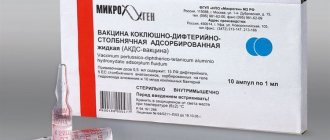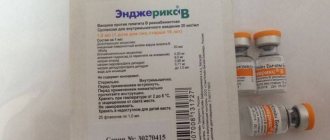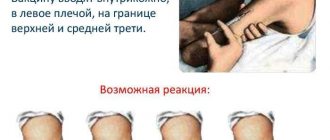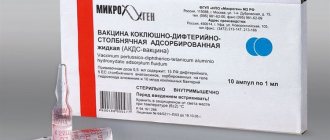What is a medical exemption from vaccinations?
A medical exemption from vaccinations is an official document providing a deferment from vaccination for medical reasons. Not every human body is able to withstand vaccination properly. In some cases, it is better to buy a certificate refusing vaccinations in Moscow than to expose your health to additional risks. It is worth remembering that medical withdrawal and refusal to vaccinate are not the same thing. In the first case, we are dealing with an official document that spells out the medical reasons that are preventing vaccination at the moment. A refusal is a decision of parents, guardians or the patient himself to refuse vaccination for personal reasons, formalized in writing.
- List of contraindications for vaccination:
- Who issues and how to obtain a waiver of vaccinations
- Where can you apply for a medical exemption from vaccinations in Moscow?
- In what cases is a medical outlet not needed?
- How to correctly refuse vaccinations
Where can I get an exemption from vaccination in Moscow? For this purpose, you can contact both a municipal and private clinic. A specialized specialist will examine the patient. As a result, the grounds that impede vaccination will be established (or refuted). If during examinations a visitor is found to have contraindications to vaccinations, then in addition to medical advice, he will be given recommendations on how to improve his health. A corresponding note will be made on the vaccination card. Sometimes the doctor prescribes additional tests or refers the patient for tests to confirm or refute his suspicions.
Medical exemption from vaccinations for adults and children: what are the reasons for issuing a certificate and how to get it?
With the advent of vaccines and the introduction of mandatory immunization procedures, a massive fight against many deadly infections began. Today, the epidemics that wiped out most children are not rampant.
Diseases such as whooping cough, tetanus, and polio are quite rare. Most often, for this reason, parents refuse to vaccinate their children.
If the chance of contracting a dangerous disease is insignificant, why expose the baby to tests? But is it? Are vaccines harmful and on what grounds can one request an official exemption from vaccination?
What is a medical outlet?
A medical exemption from vaccinations is a special medical opinion on a temporary refusal to undergo vaccination. The certificate excludes the possibility of vaccination temporarily or permanently. To obtain a medical exemption, serious reasons and a thorough examination are required. The document is issued to both adults and infants and children up to one year old.
A medical exemption should not be confused with a voluntary refusal of vaccinations. You can write a refusal for any reason, even if the child is healthy.
Parents may be afraid of infection through serum or consider the child too weak to fight foreign antigens - there can be a lot of reasons. But what they have in common is the desire to free their children from vaccination.
Medical advice does not depend on the attitude of parents towards vaccinations. The document is issued for medical reasons, the results of tests and examinations by doctors.
The media speak quite negatively about vaccination procedures, disseminating information about the dangers of vaccinations, negative consequences, including the development of the disease for which vaccination was carried out.
WHO and pediatricians urge not to believe rumors. If there are no contraindications, vaccinations are safe.
The drugs contain either dead disease cells or a sufficiently small dose of live antigens that do not threaten the child’s health. The purpose of vaccination is to help the body produce its own antibodies against serious infections.
Subsequently, antibodies protect a person from infection or significantly alleviate the course of a severe form of the disease.
Nowadays, we do not meet patients with diphtheria or tetanus (we recommend reading: symptoms and treatment of tetanus in a child). However, it should be understood that the absence of these infections in the modern world is due to vaccination. Vaccinations are vital for protecting a small organism, and in order not to officially give them to a child, strong recommendations from doctors are needed.
Reasons for issuing a medical exemption from vaccinations for adults and children
A certificate of exemption from vaccination can be temporary or permanent. There are reasons for receiving each of them. The document clearly indicates the validity period of the medical opinion.
In Russia, the validity period of a medical withdrawal can be at least a month and at most a lifetime. The latter option is rare; to confirm it, it is necessary to assemble a special commission that makes a decision.
A medical exemption is given for exemption from specific vaccinations, and not from all of them at once.
Temporary
A temporary medical exemption is issued based on a medical examination. Such a certificate means that you or your child are prohibited from administering serum during a specific period. Vaccination is carried out after the document expires.
Reasons for obtaining a temporary medical outlet:
- Chickenpox.
- Allergic reactions. In this case, the patient is prescribed antihistamines and, after treatment, is vaccinated.
- Acclimatization, which entails temporary malaise and decreased immunity.
- Recent contact with an infected person.
- Deviation of temperature from the norm and general weakness of the body. Injections are made at a temperature of 36-37 degrees. It is not always possible to obtain a medical outlet in case of high or low temperature. Doctors often suggest assessing the patient’s condition after a few days. If everything is in order, the child or adult is vaccinated. Some doctors do not take this contraindication into account and still vaccinate. In this case, it is necessary to insist on a delay, since a temperature deviation may cause some complications after vaccination.
- ARVI, flu. The certificate is issued for a month: for the duration of the illness plus 2 weeks of the preventive period. Quite often, doctors can vaccinate in case of residual effects if they are sure that the patient has recovered (for example, cough).
There are also circumstances in which standard serums are replaced by milder options or analogues. This happens, for example, with an allergy to the substances of the drug or reduced immunity.
Permanent
The main reasons for issuing a permanent medical exemption:
- HIV and AIDS;
- exacerbation of diseases;
- decreased hemoglobin;
- anemia;
- malignant tumors;
- some chronic diseases;
- chemotherapy;
- individual intolerance to serum components.
Who issues the certificate and for how long?
Exemption from vaccinations is issued at the medical institution where the citizen is observed. This may be a public or private clinic.
To obtain a medical tap, you must contact a specialist, taking into account contraindications for yourself or your child.
After an examination and laboratory test results, the doctor will confirm the medical indications for issuing a certificate or authorize vaccination.
If the diagnosis is confirmed, the attending doctor has the right to independently issue a certificate of exemption. It looks like a standard medical certificate on official letterhead: indicating the validity period, examination results and the patient’s diagnosis, and is certified by stamps.
The document is issued free of charge, it does not take long to complete the document - by the end of the consultation with a specialist, you can receive a certificate of exemption. A deferment mark is placed on the vaccination card.
If the doctor has doubts or there is a need to issue a medical exemption for a long period, a special medical commission is assembled to resolve the issue.
How long the medical exemption period lasts, which vaccines the certificate provides an exemption from and what the further individual vaccination schedule will be - all this depends on the diagnosis and recommendations of the doctor or immunological commission.
Some vaccinations have no contraindications and should be given to everyone. These include ADS and ADS-M - vaccinations against tetanus and diphtheria in small doses (we recommend reading: what are the contraindications for tetanus vaccination for children?).
Officially, you can refuse such vaccinations only if you have a lifelong medical exemption.
To preserve your health and the health of your child, WHO urges you to refuse vaccinations solely for medical reasons. If you receive a medical exemption from specific vaccines, you must create an individual schedule for further vaccination. A pediatrician, therapist or immunologist will help with this.
Source: https://RosMedPlus.ru/vakcina/medotvod-ot-privivok-prichiny.html
List of contraindications for vaccination:
- Vaccinations against diphtheria, whooping cough, and tetanus are contraindicated for diseases of the nervous system that are in the acute period. If, after a previous vaccination, the patient experienced strong reactions in the form of increased body temperature, edema and hyperemia, then in this case revaccination is undesirable. You should not get vaccinated if you have a history of seizures.
- Vaccination against tuberculosis (BCG) is contraindicated if the child was born much prematurely, there is an acute period of chronic diseases, acute infections, hemolytic jaundice, severe damage to the nervous system, a history of tuberculosis, oncological tumors, radiation, etc.
- Vaccination against polio is not carried out if the patient has a primary immunodeficiency state, neurological disorders, exacerbations of chronic diseases, infectious diseases, hypersensitivity to streptomycin, polymyxin, neomycin.
- Pneumococcal conjugate vaccines should not be administered to patients who have had a severe allergy to previous vaccinations, acute or non-acute infections, or reactions to vaccine components.
- Vaccinations against hepatitis B cannot be used in the following cases: allergies to components of the drug, exacerbation of chronic diseases, elevated body temperature, acute respiratory viral infections.
- The Hib vaccine against Haemophilus influenzae is contraindicated in cases of exacerbation of chronic diseases or in the presence of an allergy to the components of the vaccine.
- Vaccinations against measles, mumps and rubella are not carried out if an allergic reaction to drug components has previously been noted, there is oncology, the patient is carrying a child, or immunodeficiency states are noted.
In light of recent events related to the coronavirus pandemic, a list of contraindications for vaccination against COVID-19 has been developed. Thus, the vaccine will not be given to those patients whose body temperature exceeds 37 degrees and those who have recently consumed alcohol. Some other contraindications to vaccination against coronavirus:
- hypersensitivity to any component of the vaccine;
- exacerbation of chronic diseases;
- the presence of infections in the body;
- period of pregnancy and breastfeeding.
Vaccination of persons under 18 years of age is questionable. It is not yet known whether children and adolescents will be vaccinated.
In any case, we recommend visiting a doctor to clarify the diagnoses provided for refusing vaccination against coronavirus.
back to menu ↑
Consilium and commission
If the patient’s condition is controversial, laboratory and instrumental studies do not provide clear evidence that vaccination cannot be done, the person is referred to a medical commission. In most cases, experts give a deferment for 1 year, less often - for life. This is especially true for children, since as the child grows, the immune system strengthens and chronic diseases go away. The disappearance of pathologies is also influenced by hormonal changes during adolescence.
Hematologists, oncologists, allergists, immunologists, and infectious disease specialists provide medical advice against influenza vaccination for adults due to internal diseases.
Who issues and how to obtain a waiver of vaccinations
The procedure for obtaining a vaccination waiver is not complicated:
- First, you need to visit a specialized specialist in a municipal or private clinic and get a medical opinion from him about the presence of contraindications to vaccination.
- With the received document, you should visit your family doctor or therapist, who will write a medical certificate. The document will specify the timing and recommendations of a specialist regarding abstinence from vaccinations.
- A medical certificate is presented at the place of request.
In some cases, a special immunological commission is convened, at which the final decision is made on the doctor’s recommendations. This is one of the ways ,
how to officially refuse vaccinations.
back to menu ↑
After the medical examination
If the patient has been issued a vaccination ban, then this document requires drawing up an individual vaccination schedule. This is what the pediatrician does.
Often parents and their child visit an immunologist so that he can draw up a vaccination schedule taking into account the condition of the little patient. If parents are afraid of adverse reactions from vaccines, then they can refuse vaccination. When adults do not want to vaccinate their child, they can write a refusal.
Why is the number of medical outlets decreasing?
Parents understand that the flu can cause serious complications that can harm the child’s body. It will be difficult to cure such consequences of infectious pathology.
The only correct solution to help prevent serious illness is vaccination. Therefore, now the number of refusals and medical withdrawals from vaccinations has decreased compared to previous periods.
When thinking about whether to get a flu vaccine, a person is faced with a colossal amount of questions. Starting from how much such a vaccine costs and ending with whether it can be wetted. In addition, doctors can rarely give comprehensive advice and recommend the only drug available in their institution. Therefore, it is important to be aware of the available alternatives offered for vaccination.
Where can you apply for a medical exemption from vaccinations in Moscow?
Medical withdrawal from vaccinations can be temporary or permanent. The document is valid temporarily if the chronic pathology of the vaccinated person is in the acute phase or there is an infection of varying severity in the body. As soon as your health condition stabilizes, you can vaccinate.
Absolute contraindications include severe allergic reactions to vaccine components, malignant pathologies, and AIDS. In this case, the medical exemption from vaccinations does not expire. As mentioned earlier, the document can be issued both in a public clinic and in a private medical institution. In the latter case, you will have to buy a medical exemption from vaccinations, since such a service is provided on a paid basis.
Medical advice from vaccinations
Design
back to menu ↑
Possible reasons
Reasons for avoiding vaccinations:
- Residual manifestations of the disease. In this case, a medical exemption from vaccination may be given for a short period. The doctor will need to find out that the symptoms of the disease have completely passed. When the child recovers, he can be vaccinated.
- During illness. When children are sick, they cannot be vaccinated, even if the symptoms are only a cough or runny nose.
- If the level of hemoglobin in the blood is reduced. In this case, vaccination cannot be carried out. In this case, they may be given a medical exemption for a certain period.
- If the child has reduced immunity.
When children are often sick and their immunity is weak, vaccination is carried out only with special drugs that have fewer side effects. Weaker vaccines are also prescribed to a child when he or she exhibits an allergic reaction to any substance. An immunologist can prescribe milder drugs.
Doctors may advise against flu vaccinations if children have a pathology of the nervous system, when immunodeficiency, convulsions, high fever or colds are observed. The reason for the ban is malignant tumors.
The child is sick
A temporary illness - sore throat, bronchitis, ARVI, pneumonia or infectious disease - is a contraindication to vaccination. A sick child should not be vaccinated. His body may not be able to withstand the double impact of infection, which creates difficulties for recovery and does not contribute to the formation of immunity from influenza. If a child is sick, the pediatrician gives him a temporary medical exemption; before vaccinating, the doctor must make sure that the child is healthy.
Doctors believe that vaccination can be carried out no earlier than a week after the child recovers. If children have had pneumonia or the flu, the period increases to two weeks.
Sometimes the doctor suggests a vaccination, but the parents see that the child has not yet recovered. In such a situation, parents have the right to write a refusal to vaccinate or go to another doctor.
General weakness and concomitant diseases
Before vaccination, the doctor must examine the child, conduct an examination, and prescribe tests. If children experience weakness, headache, and drowsiness, the pediatrician should prescribe a blood test to determine hemoglobin levels and the absence of inflammation.
The cause of illness may be a lack of vitamins or an unbalanced diet. In this case, a medical exemption is given for an indefinite period, which depends on the condition of the child.
If a child is being treated in a hospital for another pathology, such as pneumonia, or has undergone an examination or undergone surgery, then vaccination cannot be performed.
In this case, for medical reasons, a pediatrician or the attending physician in the hospital gives a recusal. If immunity is reduced after illness, then the decision is made by an immunologist.
Temperature deviations
Often, when the body temperature is elevated, children are given a break for a while.
If a child has a high body temperature or a loss of strength, then the vaccine cannot be given. What do you think are the most important factors when choosing a medical facility?
Sometimes in this case, specialists do not give medical advice, but recommend coming when the temperature returns to normal. Doctors consider hyperthermia, as well as weakness and malaise, to be a temporary phenomenon.
Absolute liberation
Individual intolerance to the vaccine or its composition is considered an absolute medical issue. The following flu vaccines are currently used:
- Flu;
- Influvac;
- Vaxigrip.
If a small patient had an allergic reaction when administered such a pharmaceutical, this is an absolute contraindication for re-immunization. In addition, a medical exemption is given in case of intolerance to the components of the vaccine. These include:
- neomycin;
- ovalbumin;
- egg white.
These components are found in small quantities in the preparations, but can cause allergies. Information about vaccine intolerance must be recorded on the card.
In what cases is a medical outlet not needed?
In some cases, medical challenges are unfounded. As a result, a child who has not received a vaccination due to an allergic disease, somatic pathology, or neurological problems finds himself face to face with dangerous infections without protection in the form of antibodies that could have formed as a result of vaccinations. The leaders among unfounded reasons for medical refusals from vaccinations are:
- Mild anemia, which is caused by a lack of iron in food. In this case, you should not insist on medical treatment. Only severe anemia can be an indication for a ban. And even in this case, it is worthwhile to undergo a thorough examination first.
- Encephalopathy of a perinatal nature. This term refers to a wide range of problems with the central nervous system that arose during or after childbirth in the first months of life. The decision on the advisability of vaccinations in this case is made by a pediatrician and a neurologist. This allows you to prevent a possible progressive process. If the examination reveals stable neurological disorders, then the vaccine will be given. A medical device is used if a baby is diagnosed with cerebral palsy or Down syndrome.
- Allergic diseases. In this case, vaccination should be carried out under the strict supervision of an allergist, who selects additional antihistamines to relieve the symptoms of a possible allergic reaction. After all, such babies are more susceptible to infectious diseases if they are not vaccinated.
Doctors recommend not to abuse the opportunity to take a medical exemption, but still try to vaccinate children for their own safety.
In what cases should you consider consulting a specialist in immunoprophylaxis?
Consulting a doctor on immunoprophylaxis may be necessary if your child is often sick and has already had medical examinations. Also, if the child missed vaccination not for medical reasons, but due to lack of vaccine or due to other circumstances. In this case, you will most likely need to consult an immunologist to determine the child’s immune status. We recommend that you do not make decisions about vaccination alone - it is better to consult a specialist.
Children with immunodeficiency: medical outlet
These children are susceptible to complications when using live vaccines. A number of signs may indicate primary immunodeficiency:
- Presence of family members with immunodeficiency (possible heredity);
- Severe purulent disease;
- Thrush in the mouth or other mucous membranes;
- Anorectal fistula;
- Seborrheic eczema;
- Pneumocystis pneumonia;
- Thrombocytopenia.
If such diagnoses are noted, then it is worth undergoing an immunological examination before scheduling a vaccination using a live vaccine. If immunodeficiency is detected, an inactivated vaccine is used instead of a live vaccine. This is also done when it is not possible to undergo immunological examinations for a number of objective reasons. This is necessary to prevent possible complications.
Medical treatment for exacerbation of chronic diseases
If a child has a chronic disease that has worsened, but the time has come for a routine vaccination, then he is issued a temporary medical exemption. The document represents a delay until remission or complete recovery occurs. The delay period is determined by the doctor himself, based on the risk of developing possible complications of chronic pathology. The duration of such a deferment usually does not exceed 30 days after an exacerbation of a chronic or acute illness. If a child has suffered meningitis, the deferment may last for six months. The period of temporary medical withdrawal is adjusted only by the doctor in each case individually.
Vaccination after medical examination
If the medical withdrawal period has passed, then you need to consult a doctor on immunoprophylaxis. If, after examinations, the state of health is considered satisfactory, then vaccination is permitted. An individual vaccination calendar is drawn up for the patient, taking into account the difference in time spent on rehabilitation.
Complete medical exemption from vaccinations
In contrast to deferment, a complete medical withdrawal from vaccinations implies an absolute refusal to administer the vaccine due to the high risk of complications. According to statistics, only about one percent of patients are not vaccinated due to complete medical withdrawal. Another percentage of children are not vaccinated because their parents refuse.
back to menu ↑
Reasons for obtaining a medical exemption from vaccination
A medical certificate will not be issued to a child if his parents decide to refuse vaccination, since the doctor is personally responsible for every document he signs.
This means that he must make sure of the obvious and undeniable contraindications that the patient has for this or that vaccination. Medical withdrawal is distinguished according to absolute indications, when the patient’s body is completely unable to respond to the administered vaccine by developing immunity.
Moreover, having vaccinated such a person, you can get complex post-vaccination reactions and even complications. But if a person is sick with ARVI or various infectious pathologies, his health is weakened only for a while. This condition will definitely return to normal, but it is not advisable to get vaccinated at this time. In such a situation, a temporary MO is issued.
Temporary
The duration of such a medical withdrawal may vary. It all depends on the patient's condition.
The reason for temporary medical withdrawal may be:
- An increase in temperature on the day of the procedure is the most common reason to receive a medical discharge. If the reading is 37°C and there is general malaise, MO may not be given. If the doctor sees that the patient will recover soon, vaccination will take place as soon as possible. When the temperature is accompanied by a runny nose and cough, MO is mandatory, and the vaccine is given after complete recovery;
- acute diseases . This is a common situation. By the time of vaccination, the patient (both child and adult) experiences an acute pathology. MO will be received until complete recovery + another month;
- the patient has had an acute respiratory viral infection (flu, pneumonia) or a mild intestinal infection - immunization is allowed the next day after the temperature has returned to normal. If a child comes for vaccination with rhinitis, but does not have a fever, this is not considered a contraindication, especially if the child is prone to ENT infections. But practice shows that no one will vaccinate a sick patient. MO will be given for the duration of the illness + 2-4 weeks after recovery;
- blood transfusion and administration of immunoglobulins (IG) . After a course of IG injections, a break of up to 3 weeks is taken and only then immunoprophylaxis is carried out. Exceptions: polio and yellow fever vaccines;
- immunosuppressive therapy . In this case, vaccination with live preparations is possible 6 months after the end of the main treatment.
At the end of the temporary medical treatment, the patient is examined again by the doctor, after which the green light is given for vaccination, or the procedure is postponed again.
Life
In this case, the vaccination is canceled forever (or for a whole year) based on a confirmed absolute contraindication.
- severe reactions and complications to a previously administered vaccine. Symptoms are as follows: temperature over 40°C, severe hyperemia at the injection site (more than 8 cm) and severe swelling. Complications include anaphylaxis, encephalopathy and convulsions. The vaccine that causes such consequences is subsequently replaced by a gentle analogue;
- primary immunodeficiency. In this situation, the supply of live polio drugs, BCG and against measles + rubella + mumps is prohibited;
- oncology;
- pregnancy. Vaccination with any live preparations is prohibited;
- immunodeficiencies burdened with oncology. Immunization is postponed until complete recovery, and after the end of maintenance therapy, 3 or more months should pass;
- HIV-infected patients. Babies from HIV-positive mothers (until their status is identified and a final diagnosis is made) are not vaccinated against tuberculosis until they are one and a half years old;
- AIDS;
- undergoing chemotherapy;
- allergy to the vaccine composition;
- anemia and systemic chronic pathologies.
How to correctly refuse vaccinations
If there are no medical contraindications to vaccination, but the parent does not want to vaccinate his child for a number of personal reasons, then he can write a refusal. A free form of writing a refusal to vaccinate is allowed. You can also follow the recommendations in this regard, prescribed in the order of the Ministry of Health and Social Development of the Russian Federation dated January 26, 2009 N19н. But since the wording of “recommendations” means that there is no mandatory form, the refusal can be issued in any form. The main thing is that the document contains the personal data of the applicant (full name of the child and parents), information about which particular vaccination they wish to refuse. The document also states that the applicant has been informed of all possible consequences of such a decision. A signature and current date are required.
Influvac: complications and reasons for medical withdrawal
Influvac can be purchased at a pharmacy with an appropriate prescription. The drug is immediately ready for use, as it is available in syringes with a dosage of 0.5 ml. One vaccine costs about 1,300 rubles. Influvac contains antigens of two types of viruses: A and B.
Influvac
The annual update of the composition carried out by WHO makes it possible to enhance the preventive effect of the drug. The formation of the body’s immune response lasts 14 days and, depending on the individual characteristics of the body, extends over the next six months or a year.
Before answering the question of whether to get the Influvac flu vaccine or not, it is worth considering possible complications. According to reviews, some of those vaccinated reported migraine attacks and a feeling of fatigue. In rare cases, convulsions began after administration. The most common local consequences are hematoma and hyperemia, but the injection site can be wetted. Fever-like conditions accompanied by muscle pain indicate an allergy to Influvac and serve as the basis for medical withdrawal for repeated vaccinations.
During pregnancy, an injection of the drug Influvac is not dangerous for either the child or the mother. The same information has been clinically confirmed regarding the lactation period. But a pregnant woman can still ask the doctor to issue a medical outlet if she considers it appropriate. There is no need to refuse a flu shot when driving, since Influvac does not affect this ability.
Pregnancy is not a reason to refuse vaccination











